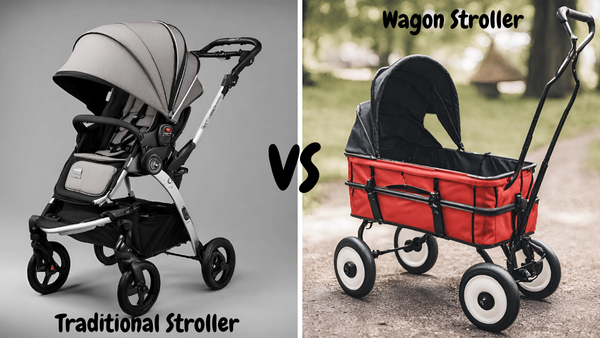Are you looking for the best probiotics for your infant?
It’s no secret that probiotics are important for a baby’s health, but it can be hard to know which ones are the best. That’s why we’ve done the research for you and put together this comprehensive guide to the best probiotics for babies. We’ve looked at the ingredients, the research, and the reviews to find the best probiotics for babies.
We’ve found that infant probiotics that make it on the best list are those that contain a variety of probiotic strains, including Bifidobacterium, Lactobacillus, and Streptococcus thermophilus. These strains are important for a baby’s health, as they can help to boost their immune system and aid in digestion. We’ve also found that the best probiotics for babies are those that are easy to administer, as some babies may not be able to swallow capsules or tablets.
So if you’re looking for the best probiotics for your little one, look no further! This article will provide you with all the information you need to make an informed decision and ensure that your baby has the best probiotics to support their health and development. Read on to learn more about the best probiotics for babies and get ready to give your little one the best start in life!
What Are Probiotics?
Probiotics are beneficial microorganisms that help to keep their bodies functioning properly. They’re found in food, supplements, and even some skincare products. Probiotics can help to boost a baby’s immune system and aid in digestion. They may also help to reduce the risk of allergies and eczema.
What Are The Benefits Of Probiotics For Babies?
Today, we're talking about something you may not have considered yet – baby probiotics. These little superheroes are essential to your baby's health and well-being. So, buckle up as we dive into the magical world of baby probiotics!
Did you know that a baby's gut is home to trillions of microorganisms? These tiny creatures play a crucial role in digestion, immunity, and overall health. And, guess what? Probiotics are the good guys among these microorganisms.
Here are some amazing benefits of baby probiotics:
- Boosts your baby's immune system
- Helps prevent and treat diarrhea
- Reduces colic symptoms
- Enhances nutrient absorption
- Promotes a healthy gut microbiome
So, if you want a happy, healthy baby, it's time to consider adding baby probiotics to their daily routine!
Liquid Probiotics: Pros and Cons
Pros:
- Taste: Liquid probiotics typically have a neutral or mildly sweet taste, making them more palatable for babies. Some brands even offer flavored options to make them more appealing.
- Ease of Use: Liquid probiotics can be easily administered with a dropper or mixed into breast milk, formula, or baby food. This makes them a convenient option for on-the-go parents.
- Fast Absorption: Since liquid probiotics are already in a dissolved form, they may be more quickly absorbed by the body, allowing for faster results.
Cons:
- Shorter Shelf Life: Liquid probiotics generally have a shorter shelf life compared to their powdered counterparts. They may also require refrigeration to maintain potency
Probiotic Strains: The Unsung Heroes of Gut Health
When it comes to the health of our little ones, we want nothing but the best. And that's why many parents are turning to baby probiotics to support their child's digestive and immunity. But not all probiotics are created equal, and it's important to know which strains are most beneficial for babies.
One strain that is especially helpful for infants is Bifidobacterium infantis. This probiotic is naturally found in breast milk and helps promote healthy gut bacteria, which can improve digestion and reduce the risk of colic and other digestive issues. Another important strain is Lactobacillus rhamnosus, which has been linked to a decrease in the incidence of eczema and allergies in babies.
Other probiotics to look for include Bifidobacterium lactis, which can help boost the immune system, and Streptococcus thermophilus, which supports healthy digestion. While there are many types of probiotics available, it's important to choose a supplement specifically formulated for babies, with strains that are safe and effective for their delicate systems.
Maintaining a healthy gut is crucial for overall health and well-being, especially for babies. Probiotics are a great way to support this, but it's important to choose the right strains for the job. Bifidobacterium infantis and Lactobacillus rhamnosus are two of the most important strains for infants, but a supplement with a variety of strains can help support overall gut health.
5 Actionable Tips to Maximize the Benefits of Baby Probiotics
As a health-conscious parent, you may have heard about the benefits of probiotics for your baby's gut health. To help you make the most of these beneficial bacteria, we've compiled five research-based, actionable tips that are easy to understand and incorporate into your daily routine.
1.Choose Age-Appropriate Probiotic Products
Not all probiotics are created equal, and it's essential to choose a product specifically designed for infants. Look for probiotics with strains like Bifidobacterium infantis, Bifidobacterium lactis, or Lactobacillus rhamnosus GG, which have been well-studied and proven safe for babies.
2. Start with a Low Dose and Gradually Increase
When introducing probiotics to your baby, start with a low dose to allow their delicate digestive system to adjust. Over time, you can gradually increase the dose according to the product's recommendations or your pediatrician's advice. Remember, it's always best to consult with your doctor before starting any new supplement regimen for your baby.
3. Administer Probiotics at the Right Time of Day
To maximize the benefits of probiotics, give them to your baby during or just after a feeding. This helps ensure that the probiotics reach the intestines where they can work their magic. A study published in JAMA Pediatrics found that administering probiotics with breast milk or formula significantly reduced the risk of developing necrotizing enterocolitis in preterm infants.
4. Be Consistent and Patient
Probiotics need time to colonize the gut and provide their full range of benefits. Be consistent with your baby's probiotic regimen and continue giving them the supplement daily for at least a few weeks to see noticeable improvements in their digestion, immunity, or skin health.
5. Combine Probiotics with a Healthy Diet
To maximize the benefits of probiotics, ensure that your baby is also consuming a balanced diet rich in fruits, vegetables, and whole grains. As they start solids, introduce a variety of fiber-rich foods that can help support the growth of beneficial bacteria in their gut.
By following these five actionable tips, you can help your baby enjoy the many benefits of probiotics for their overall health and well-being.
How We Choose The Best Probiotic For Your Baby
When choosing a probiotic for your baby, there are certain factors to consider. We take into account the strain of probiotics included in the product, as well as its potency and shelf stability. We also at whether the product is easy to administer, has been tested by-party laboratories, and what customers have said about the product.
List Of The Best Probiotic Supplements For Babies
1.Culturelle Baby Immune & Digestive Support Probiotic + Vitamin D Drops: This product contains a blend of Bifidobacterium infantis, Lactobacillus rhamnosus GG, and several other strains. It also includes Vitamin D to help support your baby’s immune system and digestive health.
2. BioGaia Baby Probiotic Drops: This probiotic is designed for babies 0-12 months old and contains L reuteri to help support digestive health. It comes in the form of drops, making it easy to administer, and can be added directly to a baby’s food or drink.
3. Mary Ruth's Organic Infant Probiotic Drops: This probiotic contains a blend of 6 strains, including Lactobacillus plantarum, Bifidobacterium longum and Lactobacillus rhamnosus. It’s easy to administer as it comes in the form of drops, which can be added directly to food or drink.
4. Garden of Life Raw Organic Probiotics: This probiotic contains 15 strains of probiotics, including Lactobacillus acidophilus and Bifidobacterium bifidum, as well as prebiotics to help nourish the good bacteria in your baby’s gut. It comes in a powder and is easy to administer, making it ideal for sensitive babies.
5.Lovebug Award-Winning USDA Organic Probiotic for Infants & Babies: This probiotic is certified organic and contains 6 high-potency, clinically-proven strains, including Lactobacillus casei and Bifidobacterium lactis. It’s also shelf-stable and comes in an easy-to-administer powder form.
Why Do Babies Need Probiotics
Liquid probiotics are live microorganisms that can help to support digestive, immune, and overall health. For babies, probiotics can be especially beneficial as they help to boost their immature immune system and aid in digestion. They can also help to reduce the chances of developing allergies, asthma, and eczema.
In addition, probiotics can help to improve the absorption of nutrients. They also help to produce vitamins, enzymes, and hormones that are essential for proper development. For these reasons, it’s important to give your baby a supplement that contains high-quality probiotics specifically designed for infants and babies.
Introducing healthy bacteria into a baby's gut microbiome can have numerous health benefits, especially for breastfed babies. Life baby probiotics contain beneficial probiotic bacteria that can help support a baby's digestive health and immune system. Breastfed babies receive some beneficial bacteria from their mother's milk, but adding probiotics to their diet can provide an extra boost. A healthy gut microbiome is essential for overall health, as it helps the body digest food and absorb nutrients. Using probiotics can help establish a diverse and balanced gut microbiome, which can lead to a healthy digestive system, fewer infections, and better overall health for babies.
Our Top Picks Of The Best Probiotics For Babies
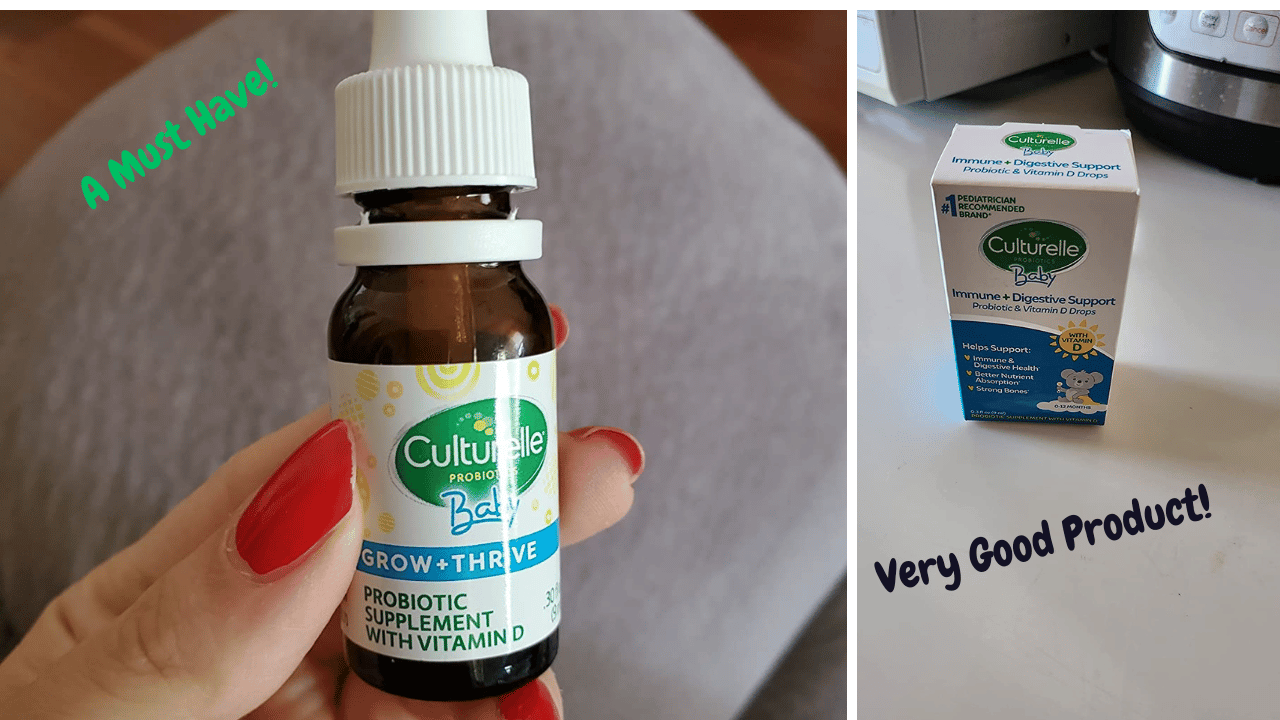
Culturelle Baby Immune & Digestive Support Probiotic + Vitamin D Drops
Culturelle Baby Immune & Digestive Support Probiotic + Vitamin D Drops, Helps Support Immune & Digestive Health in Babies, Infants & Newborns 0-12 Months, 30 Day Supply, Gluten Free & Non-GMO, 9ml
Culturelle Baby Immune & Digestive Support Probiotic + Vitamin D Drops
Why We Love It
Culturelle Baby Immune & Digestive Support Probiotic + Vitamin D Drops is the perfect choice for babies aged 0-12 months. It's formulated with Lactobacillus rhamnosus GG (LGG) and Bifidobacterium animalis subsp. lactis BB-12 probiotics, both of which have been clinically studied and proven to help with occasional tummy troubles. It's also 100% of the daily value of Vitamin D recommended by the American Academy of Pediatrics (AAP). Plus, it's drug-free, peanut-free, sugar-free, non-GMO, gluten-free, and dairy-free.
What Else Should People Know
Culturelle Baby Immune & Digestive Support Probiotic + Vitamin D Drops are easy and safe to take. Simply shake the bottle before use and dispense 5 drops once a day onto a spoon, into a bottle, or directly into your baby’s mouth while breastfeeding. Be sure to replace the cap with the dropper, and use it within 60 days once opened as it comes with a 1-month supply. With this liquid probiotic, you can be sure that your baby is getting the best start in life, building a strong foundation of health and promoting healthy development.
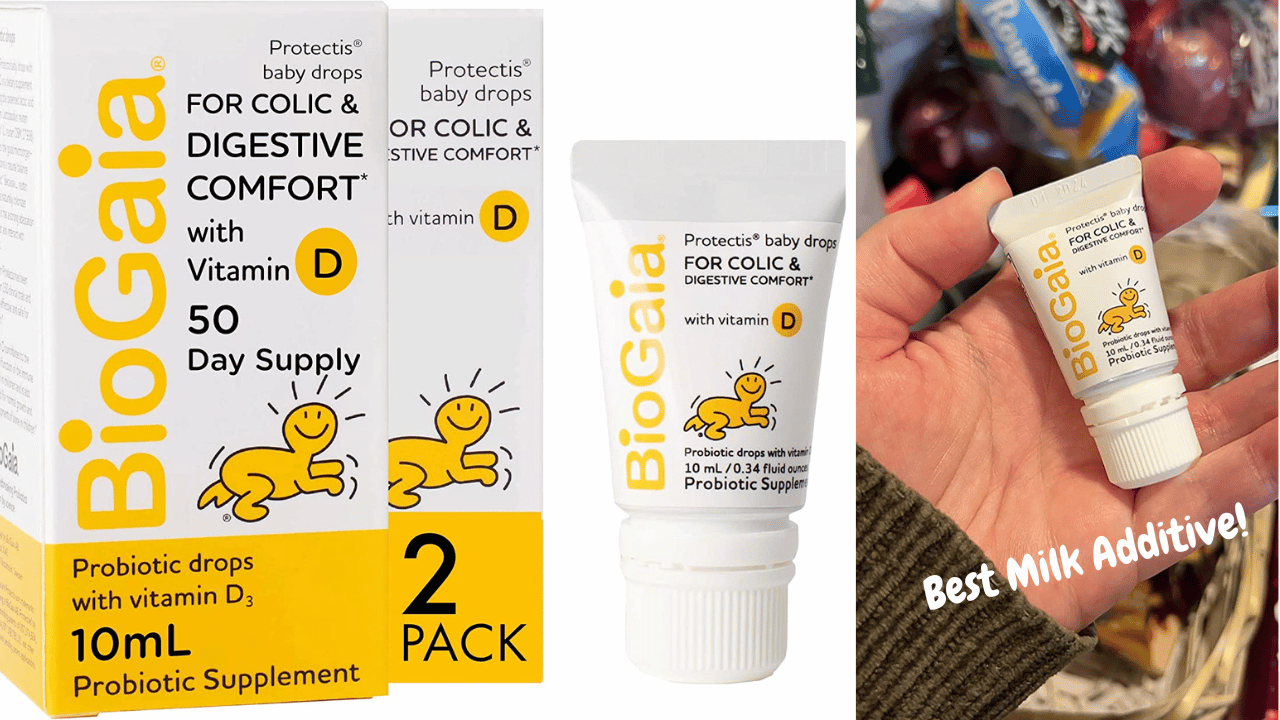
BioGaia Baby Probiotic Drops
Reduces Colic, Gas & Spit-ups | Healthy Poops | Reduces Crying & Fussing & Promotes Digestive Comfort | Newborns, Babies & Infants 0-12 Months | 0.17 oz
BioGaia Baby Probiotic Drops
Why We Love It
BioGaia Protectis Baby Probiotics are the perfect solution for parents looking for a safe and natural way to provide colic and digestive comfort for their babies. These drops contain the exclusive probiotic L reuteri Protectis, which has been clinically studied to reduce crying and fussing in colicky babies. Plus, they help relieve babies' common digestive discomforts, like colic, spit-ups, occasional constipation, and diarrhea. And, they are non-GMO and free of artificial colors, flavors, dairy, and soy.
What You Should Know
BioGaia Protectis Baby Probiotics are designed specifically for infants 0-12 months, so parents can trust that their babies are getting the right amount of beneficial probiotics. They also come in a convenient 25-day supply, so parents don't have to worry about running out all the time. With BioGaia Protectis Baby Probiotic Drops, you can give your baby the natural digestive comfort they need.
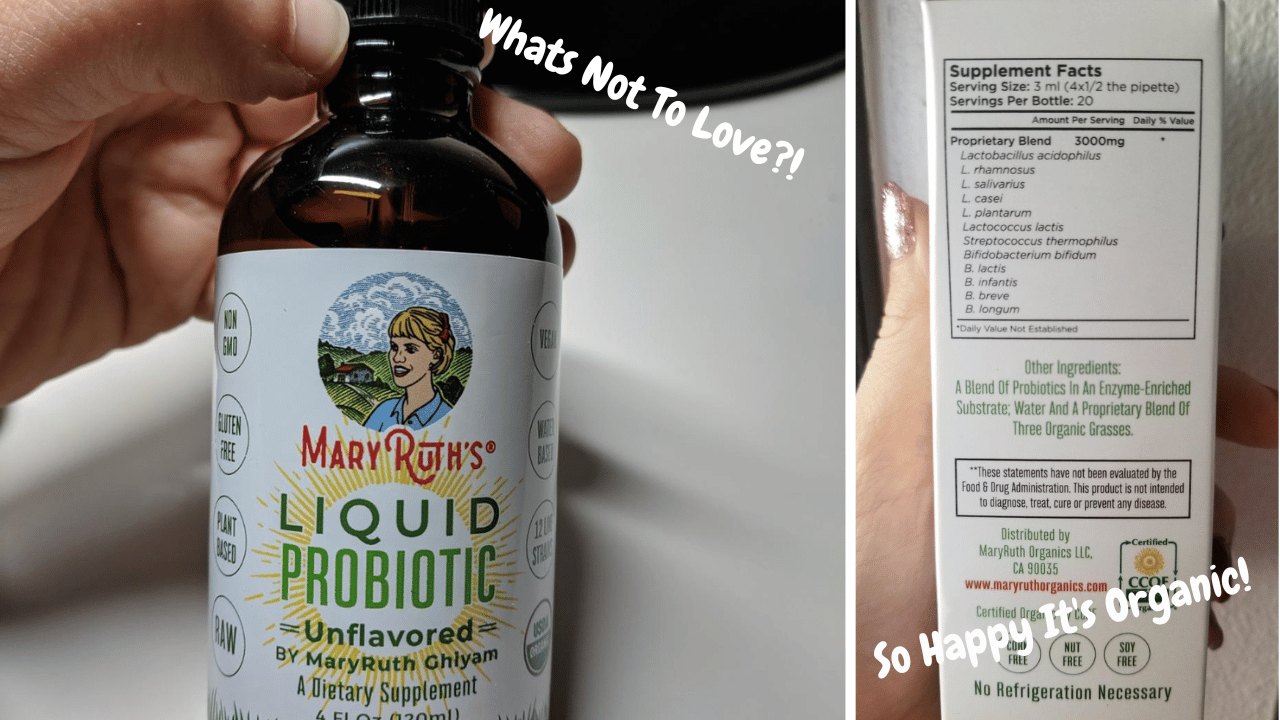
Mary Ruth's Organic Probiotic For Babies
Probiotics | USDA Organic Liquid Probiotic Drops | 4 Month Supply | Probiotics for Digestive Health | Gut Health & Immune Support Supplement | Vegan | Non-GMO | Gluten Free | 1 Fl Oz
Mary Ruth's Organic Probiotic For Babies
Why We Love It
Mary Ruth's Organic Liquid Probiotics are the perfect way to support your little one’s digestive health and immune system. USDA-certified organic, this gentle liquid probiotic blend is specifically formulated to soothe and support digestive health in 6-12-month-old babies. Containing four carefully chosen probiotic strains, our probiotic is designed to help build a good foundation during early development and promote overall health.
What You Should Know
What's more, our probiotic drops are easy-to-take and eliminate the need for hard-to-swallow pills or capsules. With Bifidobacterium infantis for stomach health, Bifidobacterium bifidum for nutrient absorption, Bifidobacterium lactis for immune system support, and Lactobacillus reuteri to possibly help with emotional regulation, Mary Ruth's Organic Liquid Probiotic Drops are the perfect way to give your baby the nutritional support they need for a healthy start.
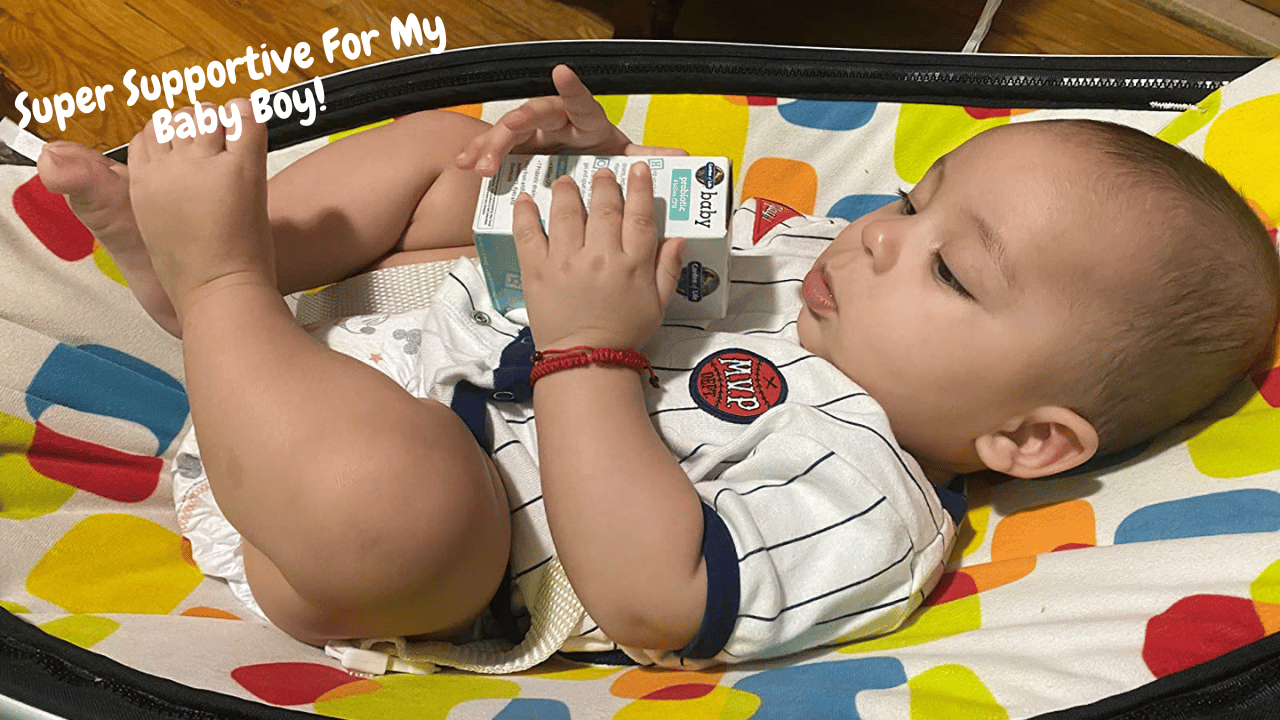
Garden of Life Baby Probiotic Drops for Immune & Digestive Health Probiotics for Babies
Infants & Toddlers 6-12 Months - 4 Billion CFU - Baby's Organic Daily Colic Support, 56 mL Liquid (1.9 fl oz)
Garden of Life Baby Probiotic Drops for Immune & Digestive Health Probiotics for Babies
Infants & Toddlers 6-12 Months - 4 Billion CFU - Baby's Organic Daily Colic Support, 56 mL Liquid (1.9 fl oz)
Why We Love It
Give your little ones the best start in life and keep their tummies happy with Garden of Life's Organic Baby Probiotic Drops. Specially formulated for babies 6 months and older, this probiotic supplement provides 4 Billion CFU of clinically studied, health-promoting probiotic strains. It helps build a strong digestive and immune system for your baby, featuring L. rhamnosus GG for the baby's digestive comfort. And with 7 unique probiotic strains, including the beneficial B. infantis Bi-26, you can be sure your baby is getting the best care and support.
What Else Should People Know
Garden of Life's Organic Baby Probiotic Drops is made in the USA with only safe organic ingredients, so you can trust that your little one is getting the best quality. Plus, it comes with an easy-to-use syringe so you can give your baby just the right amount of probiotic drops.
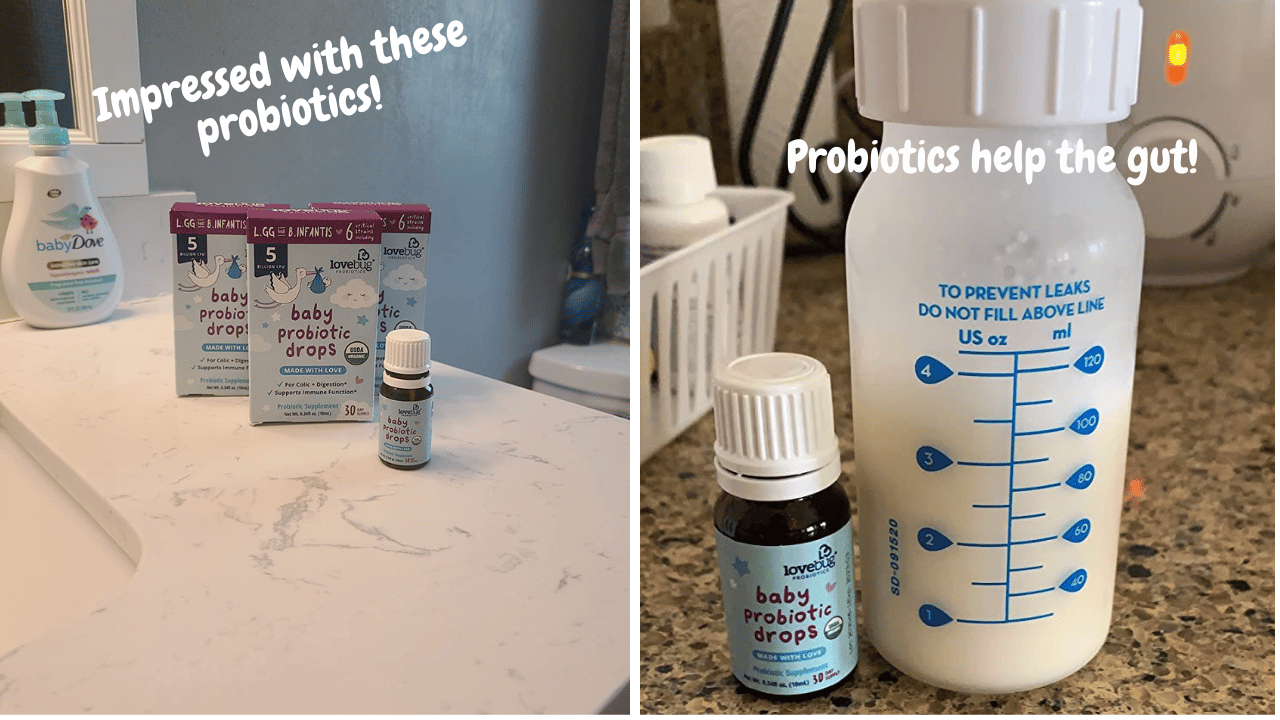
Lovebug Award-Winning USDA Organic Probiotic for Infants
Ages 0-6 Months | Helps with Colic, Reflux, Diarrhea, Constipation & Gas | Tasteless Powder | Sugar Free | Allergen-Free, Non-GMO & Vegan
Lovebug Award-Winning USDA Organic Probiotic for Infants
Why We Love It
LoveBug Award-Winning USDA Organic Probiotic for Infants is the perfect solution for newborns and infants up to 6 months of age. Its unique formula includes 3 clinically studied newborn-specific strains, ensuring that your baby gets the best care possible. It is also sugar-free and allergen-free, as well as free of artificial flavors and colors. Plus, the pre-portioned stick packs provide the exact right serving of probiotics every day with 1 Billion CFU of clinically studied strains LGG and B Infantis. On top of all that, LoveBug has been awarded the Gold Medal Mom's Choice Award, the Eco-Excellence Award, and various widely recognized "Product of the Year" awards.
What Else Should People Know
Not only does LoveBug provide superior probiotic care for your little one, but it is also incredibly easy to use. Just mix the tasteless powder into expressed breast milk and voila! Plus, it's certified USDA organic and manufactured in the USA, so you can be sure that you're getting only the best for your little one.
From Ancient Remedies to Modern Science – The Evolution of Probiotics in Baby Care
For centuries, traditional approaches to infant gut health have relied on the use of probiotics, which are live microorganisms that promote a healthy balance of bacteria in the digestive system. In ancient times, parents would often give their babies fermented milk products, such as yogurt or kefir, to support their gut health and overall well-being. It wasn't until the early 20th century, however, that scientists like Elie Metchnikoff began to explore the benefits of probiotics in more depth, setting the stage for modern research in the field.
As parents become increasingly aware of the importance of gut health for their little ones, the market for baby probiotics has exploded with a wide array of innovative products. Some recent trends include probiotic drops, infant formulas with added probiotics, and even probiotic-infused baby food. A growing body of research supports the use of specific probiotic strains, such as Lactobacillus reuteri and Bifidobacterium infantis, for addressing common infant issues like colic, constipation, and eczema. For instance, a study published in the journal Pediatrics found that infants supplemented with L. reuteri experienced a significant reduction in crying time due to colic.
While baby probiotics are generally considered safe and beneficial, there are some potential concerns and side effects that parents should be aware of. In rare cases, infants may experience mild digestive upset, such as gas or bloating, when first starting probiotics. To minimize these potential side effects, it's important to choose a reputable brand, follow dosage instructions carefully, and consider introducing probiotics gradually. Additionally, parents should consult with their child's pediatrician before starting any new supplements or treatments to ensure they are appropriate for their baby's unique needs.
In summary, baby probiotics have come a long way since the days of ancient remedies, offering parents an exciting range of options for supporting their child's gut health. By staying informed about the latest trends and research, and by making thoughtful choices regarding product selection and usage, parents can confidently incorporate probiotics into their baby's care routine for optimal health benefits.
It can be hard to find the best probiotics for babies when there are so many different brands and types on the market. How do you know which one is right for your baby?
We've compiled a list of the most frequently asked questions about probiotics for babies so you can know more about these supplements. With the right information, you can make an informed decision about which probiotic is best suited for your baby's needs.
FAQs for The Best Probiotics For Babies
What is the best probiotic for my baby?
The best probiotic for your baby will depend on their age, diet, medical history, and other factors. It’s always best to speak with your pediatrician or healthcare provider before starting any supplement. In general, look for a product that contains multiple strains of beneficial bacteria and is easy to administer.
At what age should my baby start taking probiotics?
Most pediatricians recommend introducing probiotics at 6 months old although some may suggest starting as early as months old. Always discuss the options for your child with your pediatrician or provider.
Are probiotics safe for babies?
Yes, probiotics are generally considered safe for babies. However, it's important to speak with your pediatrician or healthcare provider before starting any supplement. They can advise on the best type and dosage of probiotic for your baby’s individual needs.
Are all probiotics the same?
No, probiotics are not all the same. Different strains of beneficial bacteria can have different effects on the body, and each product should be evaluated carefully before purchasing. Always look for a product that contains multiple strains of beneficial bacteria and is easy to administer.
How do I give my baby probiotics?
Many probiotics are available in liquid or powder form, which can be added directly to a baby’s food or drink. Some products may also come as capsules or drops that can be mixed into food or administered directly. Always read the product label for instructions on how to administer the probiotic properly.
What should I look for when buying probiotics for my baby?
When shopping for probiotics, look for a product that contains multiple strains of beneficial bacteria and is easy to administer. Also, make sure to check the label for any potential allergens or additives, and always read the instructions before administering any supplement to your baby.
What are the important strains in probiotics for babies?
The most important strains of beneficial bacteria in probiotics for babies are Lactobacillus and Bifidobacterium. These strains have been clinically studied and proven to help with digestive health, immune system support, and other infant health benefits. Look for a product that contains multiple strains of these two beneficial bacteria.
How many strains are in probiotics for babies?
Most probiotics for babies contain between 4-6 strains of beneficial bacteria. Check the label to sure that the product contains multiple of Lactobacillus and Bidobacterium. These two species clinically proven to support infant health.
What does the research say about baby probiotics?
Research has shown that probiotics can help babies with colic, diarrhea, constipation, and other common digestive issues. Studies have also found that probiotics can help boost a baby’s immune system and reduce their risk of allergies and infections. However, it is important to speak with your pediatrician or healthcare provider before starting any supplement.
What does the historical trend say about infant probiotics?
Historically, probiotics have been used for centuries to help with various infant health issues. In recent years, the use of probiotics has increased as more research has revealed their potential health benefits. As more studies are conducted, the use of probiotics will likely continue to rise.
Wrapping It Up
We hope this review has helped you decide on the best probiotics for your baby. Probiotics are a great way to promote your baby’s health and well-being, and with the right product, you can be sure your little one is getting the most out of them. Remember to always speak with your doctor or healthcare provider before starting any supplement.
Thank you for reading! We hope you found this information helpful and that it helped you decide which probiotic is best for your baby. Good luck!









